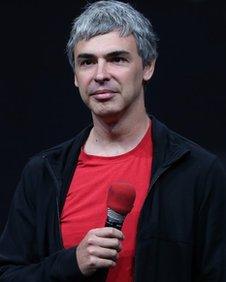Google spin-off Calico to search for answers to ageing
- Published

Larry Page has faced his own health issues
Google has a history of left-field projects, from self-drive cars to weather balloons.
So it will come as little surprise that it is now addressing one of the biggest issues of all - ageing.
It has formed a company named Calico, which will be led by Apple chairman Arthur Levinson.
Google co-founder Larry Page said it would focus on "health and wellbeing, in particular the challenge of ageing and associated diseases".
Moonshot thinking
There were few details about how the firm would tackle the issues, but experts think that it is likely that it will use Google's vast databases to search for solutions.
"Google is exceptionally well placed to get involved through their understanding of consumer activity in the delta between big data and information," said Ovum analyst Joe Dignan.
Mr Page has high ambitions for the spin-off.
"Illness and ageing affect all our families. With some longer term, moonshot thinking around healthcare and biotechnology, I believe we can improve millions of lives," he said in a blog post.
Increasingly big data is being used to help "solve" health issues.
Information management firm EMC is heavily involved in healthcare, using data analytics to predict, for example, who may be more prone to getting MRSA.
"There is a focus on big data now. It is about changing the current model of healthcare to a wellness model by combining genomic data [information about DNA] with clinical data to give personalised medical care," said Chris Roche, EMC's chief technology officer for big data.
In an, Mr Page questioned whether current scientific enquiry was focused in the right direction.
He said he found it surprising that finding a cure for cancer would only add three years to average life expectancy.
"When you really take a step back and look at it, yeah, there are many, many tragic cases of cancer, and it's very, very sad - but in the aggregate, it's not as big an advance as you might think."
Crazy ones
He himself has had health issues. He revealed in May he had been diagnosed with vocal cord paralysis, a nerve condition that affects his ability to speak.
Meanwhile co-founder Sergey Brin has been funding research into Parkinson's disease since he learnt in 2008 that he has a flawed gene that means that he has a 50% chance of getting the disease.
So far he has donated $132m (Ā£82m) to help create a DNA database of 7,000 patients and to support work on treatments for the condition.
Some may raise an eyebrow that Google has chosen rival Apple's chairman Arthur Levinson to head up Calico but chief executive Tim Cook had no such concerns.
"For too many of our friends and family, life has been cut short or the quality of their life is too often lacking. Art is one of the crazy ones who thinks it doesn't have to be this way. There is no one better suited to lead this mission and I am excited to see the results," he said in a statement.
- Published19 September 2013
- Published13 September 2013
- Published11 September 2013